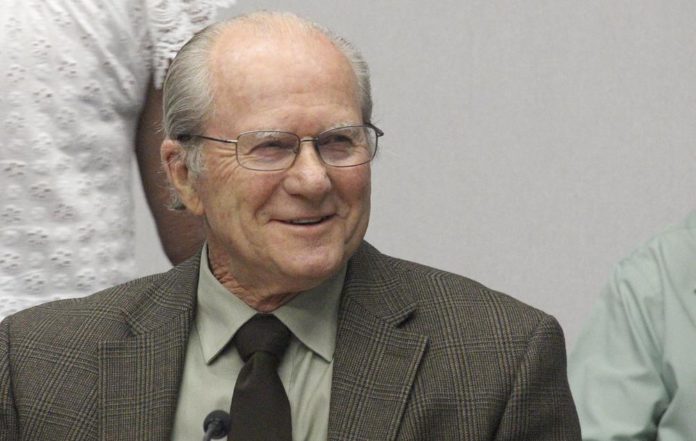
The Arizona commission that regulates utilities cannot prevent a single member from issuing subpoenas to investigate companies that the panel oversees, the state Supreme Court ruled Tuesday.
The former commissioner who filed the case, Bob Burns, said the ruling will prevent others on the panel from uniting to shield utilities from scrutiny. Burns has fought for years to get the state’s largest electric utility to acknowledge that it spent millions to elect two Arizona Corporation Commission members in the 2014 election.
Burns issued subpoenas in 2016 to Arizona Public Service Co. seeking records that would prove or disprove rumors that it was spending to elect its own regulators.
The other four commissioners blocked the subpoenas in 2016, and efforts by Burns to get the courts to confirm he had the right to investigate the utility repeatedly failed, until Tuesday. Although APS finally admitted the political spending in 2019 and Burns left office in early 2021, a single commissioner will now be able to force utilities to open their books, he said.
“It will prevent them from doing it again, for one thing,” Burns said. “I look at it as a win for the ratepayers, because this takes away the ability for the utilities to hide not only money for campaigns, (but) a major part of the commission’s job is to look at their books when they do a rate case.”
He said a utility that decides to play games with its bookkeeping to try to win higher rates will always have to worry now that a single commissioner can force them to open them for a review.
APS for years refused to admit that it was spending in elections for the five-member commission, a tactic it secretly started in 2014.
When they finally confirmed the spending in 2019, it turned out that the company owned by publicly traded Pinnacle West Capitol Corp. spent not only $3.2 million on the corporation commission races in 2014 but gave another $8.6 million to other political groups that year. In 2016, the company secretly spent $4.6 million in the 2016 commission elections. Both were breaks from company precedent not to be involved in elections regarding its regulators.
The company openly spent $40 million to defeat a ballot measure requiring it to steeply boost its renewable energy portfolio in 2018.
APS spokesman Mike Philipsen said the company was reviewing the ruling and had no immediate comment. APS was a defendant in the lawsuit.
In Tuesday’s decision written by Justice Clint Bolick that overturned rulings by a trial court and the state court of appeals, the court said the state constitution gives each of the five commissioner the right to investigate regulated utilities. The commission sets rates for electricity, gas and water providers that are granted monopolies in their service areas.
“The framers plainly meant to authorize not only the Commission but also individual commissioners, for their purposes, to issue investigatory subpoenas,” Bolick wrote in the ruling, which was joined by three other justices.
Bolick said reading the constitution to allow other commission members to block a member’s subpoena would lead to an absurd result, since commissioners are given the individual right to investigate regulated companies.
“It would expressly vest powers in individual commissioners but then subordinate that right to the unreviewable determinations of other commissioners,” he wrote.
Justice Ann Scott Timmer dissented, while two justices did not participate. Timmer wrote that while she agreed with the bulk of the ruling, she said Burns did not follow the correct procedure nor follow up on his subpoenas outside the rate case.
Timmer said Burns essentially used his investigation of the utility’s political spending to “hijack a contested rate case involving numerous parties that properly followed procedures laid out by the Commission under its constitutional authority.”
She said the commission did not improperly interfere with Burns’ investigation and warned that the ruling would give individual commission members power that can be abused.
“The majority’s opinion has lasting consequences that both violate the constitution and leave confusion, and potentially chaos, in its wake,” Timmer wrote.
Burns said it is possible that a “rogue” commission could improperly use their subpoena power, but if that happens, he noted that the company could fight it in court.
Republished with the permission of The Associated Press.













